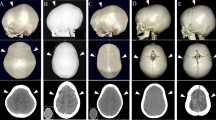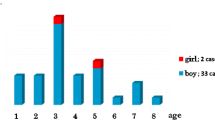Abstract
Sagittal craniosynostosis (SC) remains the most common type of synostosis, accounting for about a half of all forms. It would result from a mesenchymal disorder involving the intramembranous ossification of the sagittal suture and leading to its early fusion. No specific data on the etiologic factors are currently available. The premature ossification of the sagittal suture can result in three main types of SC, according to the different segment prevalently involved: anterior, posterior, and complete SC. The diagnosis is easily obtained by clinical examination. However, a radiological work up (3D CT scan) may be necessary to rule out hidden venous or cranial anomalies possibly associated with most severe cases, or for the surgical planning. The most common indication for surgery is the improvement of the cosmetic appearance of the skull, since a cranial deformation may have a significant psychological impact on affected subjects. To relieve from raised intracranial pressure is a further indication to surgery. Although an increased intracranial pressure can be demonstrated in a minority of affected children at diagnosis, indeed, it can present later (usually after the second/third year of life) with chronic symptoms. The role of surgery in the preservation of cognitive functions in scaphocephalic patients does not seem to be relevant, since minor anomalies of the cerebral development associated with SC would occur independently from the cranial shape. On the other hand, the surgical correction may show a protective effect on some visual skills, like the ability to fix and follow, and the fixation shift.



Similar content being viewed by others
References
Agrawal D, Steinbok P, Cochrane DD (2006) Diagnosis of isolated sagittal synostosis: are radiographic studies necessary? Childs Nerv Syst 22:375–378
Alderman BW, Lammer EJ, Joshua SC, Cordero JF, Ouimette DR, Wilson MJ, Ferguson SW (1988) An epidemiologic study of craniosynostosis: risk indicators for the occurrence of craniosynostosis in Colorado. Am J Epidemiol 128:431–438
Alderman BW, Zamudio S, Baron AE, Joshua SC, Fernbach SK, Greene C, Mangione EJ (1995) Increased risk of craniosynostosis with higher antenatal maternal altitude. Int J Epidemiol 24:420–426
Aldridge K, Kane AA, Marsh JL, Yan P, Govier D, Richtsmeier JT (2005) Relationship of brain and skull in pre- and post-operative sagittal synostosis. J Anat 206:373–385
Arnaud E, Renier D, Marchac D (1995) Prognosis for mental function in scaphocephaly. J Neurosurg 83:476–479
Aviv RI, Rodger E, Hall CM (2002) Craniosynostosis. Clin Radiol 57:93–102
Baranello G, Vasco G, Ricci D, Mercuri E (2007) Visual function in non-syndromic craniosynostosis: past, present, and future. Childs Nerv Syst 23:1461–1465
Bradley CM, Alderman BW, Williams MA, Checkoway H, Fernbach SK, Greene C, Bigelow PL, Reif JS (1995) Parental occupations as risk factors for craniosynostosis in offspring. Epidemiology 6:306–310
Brenner D, Elliston C, Hall E, Berdon W (2001) Estimated risks of radiation-induced fatal cancer from pediatric CT. Am J Roetngenol 176:289–296
Caldarelli M, Di Rocco C, Rossi GF (1979) Lumbar subarachnoid infusion test in pediatric neurosurgery. Dev Med Child Neurol 21:71–82
Chieffo D, Tamburrini G, Massimi L, Di Giovanni S, Giansanti C, Caldarelli M, Di Rocco C (2010) Long-term neuropsychological development in single-suture craniosynostosis treated early. J Neurosurg Pediatr 5:232–237
Coussens AK, Hughes IP, Wilkinson CR, Morris CP, Anderson PJ, Powell BC, van Daal A (2008) Identification of genes differentially expressed by prematurely fused human sutures using a novel in vivo–in vitro approach. Differentiation 76:531–545
Da Costa AC, Anderson VA, Savarirayan R, Wrennal JA, Chong DK, Holmes AD, Greensmith AL, Meara JG (2012) Neurodevelopmental functioning of infants with untreated single-suture craniosynostosis during early infancy. Childs Nerv Syst 28:869–877
David L, Glazier S, Pyle J, Thompson J, Argenta L (2009) Classification system for sagittal craniosynostosis. J Craniofac Surg 20:279–282
Di Rocco C (2009) Nonsyndromic craniosynostosis. In: Sindou M (ed) Practical handbook of neurosurgery, vol II. Springer, Wien, pp 561–584
Di Rocco F, Arnaud E, Meyer P, Sainte-Rose C, Renier D (2009) Focus session on the changing “epidemiology” of craniosynostosis (comparing two quinquennia: 1985–1989 and 2003–2007) and its impact on the daily clinical practice: a review from Necker Enfants Malades. Childs Nerv Syst 25:807–811
Fearon JA, McLaughlin EB, Kolar JC (2006) Sagittal craniosynostosis: surgical outcomes and long-term growth. Plast Reconst Surg 117:532–541
Florisson JM, van Veelen ML, Bannink N, van Adrichem LN, van der Meulen JJ, Bartels MC, Mathijssen IM (2010) Papilledema in isolated single-suture craniosynostosis: prevalence and predictive factors. J Craniofac Surg 21:20–24
Gardner JS, Guyard-Boileau B, Alderman BW, Fernbach SK, Greene C, Mangione EJ (1998) Maternal exposure to prescription and non-prescription pharmaceuticals or drugs of abuse and risk of craniosynostosis. Int J Epidemiol 27:64–67
Gewalli F, Guimaraes-Ferreira JP, Sahlin P, Emanuelsson I, Horneman G, Stephensen H, Lauritzen CG (2001) Mental development after modified pi procedure: dynamic cranioplasty for sagittal synostosis. Ann Plast Surg 46:415–420
Guimarães-Ferreira J, Gewalli F, David L, Darvann TA, Hermann NV, Kreiborg S, Friede H, Lauritzen CG (2006) Sagittal synostosis: I. Preoperative morphology of the skull. Scand J Plast Reconstr Surg Hand Surg 40:193–199
Hankinson TC, Fontana EJ, Anderson RCE, Feldstein NA (2010) Surgical treatment of single-suture craniosynostosis: an argument for quantitative methods to evaluate cosmetic outcomes. J Neurosurg Pediatrics 6:193–197
Hayward R (2005) Venous hypertension and craniosynostosis. Childs Nerv Syst 21:880–888
Jane JA Jr, Lin KY, Jane JA Sr (2000) Sagittal synostosis. Neurosurg Focus 9:E3
Kallen K (1999) Maternal smoking and craniosynostosis. Teratology 60:146–150
Kapp-Simon KA, Speltz ML, Cunningham ML, Patel PK, Tomita T (2007) Neurodevelopment of children with single suture craniosynostosis: a review. Childs Nerv Syst 23:269–281
Kimonis V, Gold JA, Hoffman TL, Panchal J, Boyadjiev SA (2007) Genetics of craniosynostosis. Semin Pediatr Neurol 14:150–161
Kolar J, Salter E, Weinberg S (2010) Preoperative craniofacial dysmorphology in isolated sagittal synostosis: a comprehensive anthropometric evaluation. J Craniofac Surg 21:1404–1410
Lajeunie E, Le Merrer M, Bonaïti-Pellie C, Marchac D, Renier D (1996) Genetic study of scaphocephaly. Am J Med Genet 62:282–285
Lana-Elola E, Rice R, Grigoriadis AE, Rice DP (2007) Cell fate specification during calvarial bone and suture development. Dev Biol 311:335–346
Marcus J, Stokes T, Mukundan S, Forrest C (2006) Quantitative and qualitative assessment of morphology in sagittal synostosis: mid-sagittal vector analysis. J Craniofac Surg 17:680–686
Otto AW (1830) Lehrbuch der pathologischen Anatomie des Menschen und der Thiere. Rücker, Berlin
Perlyn CA, Marsh JL, Vannier MW, Kane AA, Koppel P, Clark KW, Christensen GE, Knapp R, Lo L-J, Govier D (2001) The craniofacial anomalies archive at St. Louis Children’s Hospital: 20 years of craniofacial imaging experience. Plast Reconstr Surg 108:1862–1870
Reefhuis J, Honein MA, Shaw GM, Romitti PA (2003) Fertility treatments and craniosynostosis: California, Georgia, and Iowa: 1993–1997. Pediatrics 111:1163–1166
Ricci D, Vasco G, Baranello G, Salerni A, Amante R, Tamburrini G, Dickmann A, Di Rocco C, Velardi F, Mercuri E (2007) Visual function in infants with non-syndromic craniosynostosis. Dev Med Child Neurol 49:574–576
Ruiz-Correa S, Sze RW, Starr JR, Lin H-TJ, Spelts ML, Cunningham ML, Hing AV (2006) New scaphocephaly severity indices of sagittal craniosynostosis: a comparative study with cranial index quantifications. Cleft Palate Craniofac J 43:211–221
Scott JR, Isom CN, Gruss JS, Salemy S, Ellenbogen RG, Avellino A, Birgfeld G, Hopper RA (2009) Symptom outcomes following cranial vault expansion for craniosynostosis in children older than 2 years. Plast Reconstr Surg 123:289–297
Sgouros S (2005) Skull vault growth in craniosynostosis. Childs Nerv Syst 21:861–870
Simanovsky N, Hiller N, Koplewitz B, Rozovsky K (2009) Effectiveness of ultrasonographic evaluation of the cranial sutures in children with suspected craniosynostosis. Eur Radiol 19:687–692
Speltz ML, Endroga MC, Mouradian WE (1997) Presurgical and postsurgical mental and psychomotor development of infants with sagittal synostosis. Cleft Palate Craniofacial J 34:374–379
Starr JR, Collett BR, Gaither R, Kapp-Simon KA, Michaeleen Cradock M, Cunningham ML, Speltz ML (2012) Multicenter study of neurodevelopment in 3-year-old children with and without single suture craniosynostosis. Arch Pediatr Adolesc Med. doi:10.1001/archpediatrics.2011.1800
Starr JR, Kapp-Simon KA, Keich Cloonan Y, Collett BR, Michaeleen Cradock M, Buono L, Cunningham ML, Speltz ML (2007) Presurgical and postsurgical assessment of the neurodevelopment of infants with single-suture craniosynostosis: comparison with controls. J Neurosurg Pediatr 107:103–110
Tamburrini G, Caldarelli M, Massimi L, Santini P, Di Rocco C (2005) Intracranial pressure monitoring in children with single suture and complex craniosynostosis: a review. Childs Nerv Syst 21:913–921
Tatum SA, Jones LR, Cho M, Sandou R (2012) Differential management of scaphocephaly. Laryngoscope 122:246–253
Tonni G, Panteghini M, Rossi A, Baldi M, Magnani C, Ferrari B, Lituania M (2011) Craniosynostosis: prenatal diagnosis by means of ultrasound and SSSE-MRI. Family series with report of neurodevelopmental outcome and review of the literature. Arch Gynecol Obstet 283:909–916
Thompson DN, Malcolm GP, Jones BM, Harkness WJ, Hayward RD (1995) Intracranial pressure in single suture craniosynostosis. Pediatr Neurosurg 22:235–240
Van der Meulen J, Van der Hulst R, Van Adrichem L, Arnaud E, Chin-Shong D, Duncan C, Habets E, Hinojosa J, Mathijssen I, May P, Morritt D, Nishikawa H, Noons P, Richardson D, Wall S, Van der Vlugt J, Renier D (2009) The increase of metopic synostosis: a pan-European observation. J Craniofac Surg 20:283–286
Vasco G, Baranello G, Ricci D, Salerni A, Tamburrini G, Amante R, Dickmann A, Di Rocco C, Velardi F, Mercuri E (2008) Longitudinal assessment of visual development in non-syndromic craniosynostosis: a 1-year pre- and post-surgical study. Arch Dis Child 93:932–935
Virchow R (1851) Ueber den Cretinismus, namentlich in Franken. Und ueber pathologische Schädelformen. Verh Phys Med Gesamte Wurzburg 2:230–270
Weinzweig J, Baker SB, Whitaker LA, Sutton LN, Barlett SP (2002) Delayed cranial vault reconstruction for sagittal synostosis in older children: an algorithm for tailoring the reconstructive approach to the craniofacial deformity. Plast Reconstr Surg 110:397–408
Author information
Authors and Affiliations
Corresponding author
Rights and permissions
About this article
Cite this article
Massimi, L., Caldarelli, M., Tamburrini, G. et al. Isolated sagittal craniosynostosis: definition, classification, and surgical indications. Childs Nerv Syst 28, 1311–1317 (2012). https://doi.org/10.1007/s00381-012-1834-5
Received:
Accepted:
Published:
Issue Date:
DOI: https://doi.org/10.1007/s00381-012-1834-5




